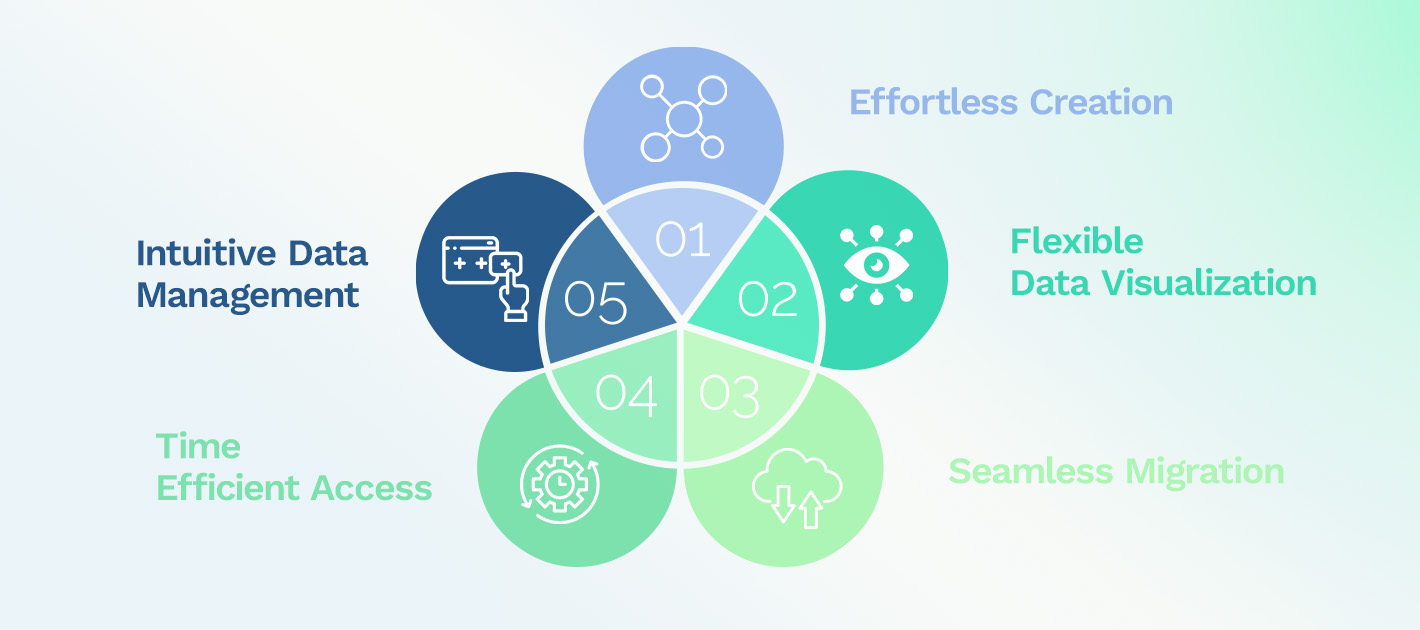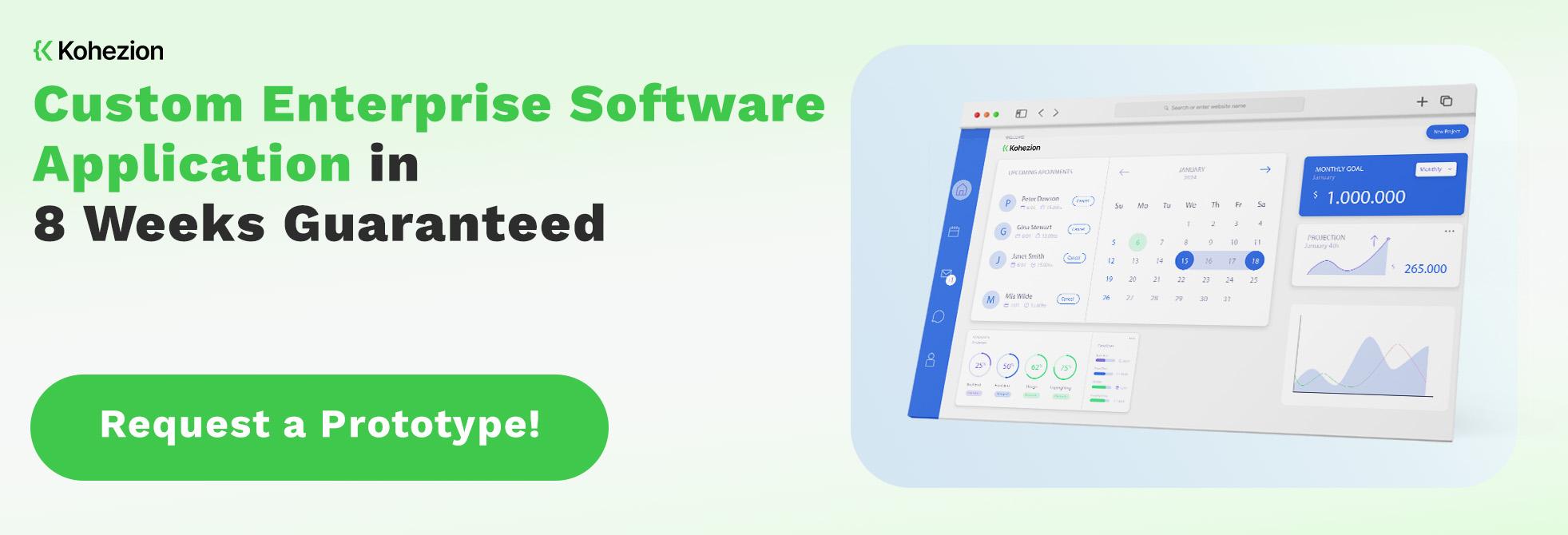If your business is growing, you’ll start dealing with more and more data from customers, partners, and other sources.
The way you handle these data and data sources can make or break your business’ future — and database applications ensure you make good choices for that future.
In this article, we’ll talk about what a database application is and its uses. We’ll go into the types of database systems you can use and dig into real-world examples of businesses leveraging them for their benefit.
What Are Database Applications?
A database application manages and organizes data for users to retrieve and use easily.
Database applications can be:
- A piece of software running a database: examples include MongoDB Server and SQL Server.
- Applications used in conjunction with a specific database system: examples include online encyclopedias, email systems, and e-commerce websites.
Multiple users can use database applications for various purposes. For example, they can enter queries about sales transactions for a specific product or a group of products.
A good database application is flexible, scalable, and applicable to a wide range of use cases.
Why Use Database Applications
Businesses use database applications for many reasons, and the advantages they get are countless. Some of them are:
Effortless Creation
Most database applications don’t require advanced programming skills. If you can use the internet and a tool like Word or Excel, you can create a basic database application.
Of course, the more complex your needs are, the more effort you’ll exert into creating the application. However, the general procedure is the same.
Flexible Data Visualization
Data visualization is an essential benefit of database applications. Grid displays, for example, work well for viewing clients or customers.
To illustrate, if your database is tied to dates and times, creating a database application with a calendar view will give you a quick overview of daily, weekly, and monthly schedules.
Seamless Migration
If you want to migrate to a cloud-based application, it’s easy to import data into your account. You might need to tweak some elements and fields, but migrating to online database applications gives you more flexibility than if you’re using a simple spreadsheet.
Intuitive Data Management
The intuitive interface of the database application products such as SQL, MongoDB, and Kohezion lets you manage data with ease.
This empowers you and your users to efficiently manage data without requiring technical skills.
Time-Efficient Access
Once set up, your database application is pretty much a grab-and-go product — input or query data with ease, complete tasks ahead of time, and streamline your processes.

Types of Database Applications
Database applications come in different forms, but they’re essential variations of three different types. They are:
SQL: The Classic
SQL is one of the most popular languages IT experts use for transactions with relational databases. These transactions must be ACID or:
- Atomic: the transaction is all or nothing.
- Consistent: the database must be consistent before and after transactions.
- Isolated: transactions must be independent from one another.
- Durable: the transactions can’t be undone after it’s successful.
The best example of SQL usage with ACID transactions is a banking system.
If you want to transfer funds from one account to another, you or the recipient has to answer calls and approval notifications — if the approvals fail, the transaction doesn’t go through and you keep your money (atomic).
This transaction doesn’t affect the information in both accounts (consistent). Each call to the database will be related to the transaction (isolated), and once the transaction is successful, you can’t cancel it (durable).
NoSQL/NewSQL: The Hipsters
NoSQL is a language system that doesn’t use SQL. It’s mainly used for unstructured data in instances where you must access or create large amounts of data quickly.
Given that, NoSQL is best for manipulating alternative data models, non-relational data, and unstructured documents. It’s much less rigid than SQL, but it also gets messier because it doesn’t adhere to ACID properties.
The best examples of NoSQL include MongoDB, Couchbase, and Redis.
Meanwhile, NewSQL refers to modern database languages that are highly similar to relational models and SQL — except they offer greater consistency and more solid ACID properties.
Social media platforms such as Facebook, X, and Instagram are the best examples of NoSQL and NewSQL platforms.
Excel: Databases or Spreadsheets?
Here’s a question: is Excel a tool for databases or spreadsheets?
Objectively, people use Excel to create spreadsheets. Spreadsheets are tables made of columns and rows.
This table format tends to confuse people into thinking that spreadsheets are relational databases.
While databases are used for data management, spreadsheets are mostly used for data storage and analysis.
However, it’s worth mentioning that many people use spreadsheets as a starting point for creating basic database applications.
| Types of Database | Pros | Cons |
| SQL |
|
|
| NoSQL/NewSQL |
|
|
| Excel |
|
|
Kohezion: A Cloud-Based Database Application Solution
Kohezion is an online database software that offers all the pros of classic database with the ease of use that Excel offers. It’s the most customizable yet easy-to-use solution.
How does Kohezion do this? Its backend uses SQL and allows ACID transactions. However, you don’t have to be an SQL whiz to use Kohezion. In short, you can create your own application without complex programming.
You can input, manipulate, and create powerful reports. You can even link applications together while taking advantage of its drag-and-drop tools to summarize large amounts of data — within minutes.
Kohezion is the most ideal option if you need a database that manages personal health information.
12 Real-Life Database Application Examples
The following are 12 real-life examples of how database applications help businesses in their respective industries.
Government Bodies
Government bodies often deal with huge amounts of data, collecting them for various reasons. This may be for climate monitoring, geological surveys, law compliance, and public health monitoring.
With catastrophes such as the COVID-19 pandemic, government bodies need robust database applications to efficiently handle exponentially growing data.
For instance, Clark County Public Health found themselves spending more time troubleshooting data management issues at the height of the pandemic. To fix this, they used Kohezion to create a configurable web-based platform that filled the gaps in their capabilities.
Ultimately, the platform allowed them to focus on responding to the pandemic instead of data management issues. Here’s the full case study for how Kohezion helped Clark County Public Health.
Non-Profit Organizations
Nonprofit organizations use database applications to keep their operations running smoothly. It also ensures the organization accomplishes their chosen goals.
For example, CEDARS Youth Services aims to help children and youth achieve safety, stability, and enduring family relationships.
At one point, CEDARS needed an advanced workflow to adhere to state/local licensing requirements. They also needed a solution that allowed them to update their database quickly.
CEDARS chose Kohezion to create the workflow and solution — and they succeeded. Since the systems’ implementation, the organization has minimized human errors and improved their overall ability to help those children and youth.
Insurance
Insurance companies often deal with financial and other sensitive data.
They also store and analyze historical data on claims, losses, and customer behavior and perform risk assessment and underwriting by.
A robust database application helps them do all of that. On top of that, such a system helps them operate cost-effectively while delivering crucial insurance services.
Such was the case for Senior Insurance Solutions, which relied on Kohezion as their digital transformation partner.
Here’s how Kohezion’s custom CRM helps Senior Insurance Solutions save $46,000 in annual database costs.
Bureaucratic Processes
Database applications can modernize organizations with bureaucratic services. Well-designed systems make them more efficient, transparent, and user-friendly.
Since bureaucratic processes often deal with diverse sets of data, a robust database application centralizes these datasets and makes them accessible to users. The end result: a more streamlined workflow with fewer bumps and humps in the process.
With Kohezion, Symphony Application Specialists (SAS) did just that. They migrated their spreadsheet data to an intuitive low-code database, cutting down their MassHealth application processing time from one and a half hours to only 10 minutes.
Here’s the full case study of how SAS accelerated their application process with Kohezion.
Healthcare
Healthcare organizations deal with highly sensitive patient data and must comply with strict rules and regulations. Otherwise, they can get in trouble with the law.
Apart from sensitive data, such organizations also deal with medical operations, billing, and management issues. Given all of that, having a secure and private database application is a big must.
Another oft-cited benefit of database applications for healthcare entities is the cost savings they can achieve. For example, Oriana House — a community corrections and chemical dependency treatment nonprofit — cut costs by 45% by switching from Excel to Kohezion.
Data Science
Data science requires you to glean insights from large volumes of data. You can then use these insights to drive business decisions and build effective predictive models.
With a well-designed database application, companies can create data science models that help them understand customers’ needs.
For example, if you have an e-commerce business, you can create recommendation systems to put products in front of customers even before searching for them.
You can also optimize retail prices, detect fraud, and create marketing analytics based on the insights you get.
Marketing
When used in marketing, database applications give you a systematic approach to collecting, organizing, and processing data.
Using a robust database application, you can learn more about customers, select the right target markets, and provide more specialized offerings. This is ideal for businesses in the retail, technology, and financial services industries.
Marketing teams can use database applications to create personalized interactions with existing and potential customers.
In other words, you avoid executing campaigns that aren’t targeted to the right customers. As a result, you cut your expenses, and the money you do spend goes to campaigns that are more likely to succeed.
Education
Schools and other educational organizations collect and use data from a variety of sources. These include students, teachers, parents, and more, usually to ensure the success of the education process.
A good database application enables schools to not only ensure efficient operations but also maintain accurate reports on grades and performances.
For universities, a database application serves as a complete university management system for streamlining and optimizing all processes.
Schools can also use robust database applications in conjunction with other systems — such as learning management systems (LMS), library systems, and more — to solidify the overall quality of the educational system.
Without a proper database application, students may not enjoy all of the benefits of holistic education programs.
Banking
Banks and other financial institutions manage vast amounts of data nearly on a daily basis, and they can’t work without powerful database applications.
Database applications help with storing and retrieving sensitive financial data. They maintain the integrity of the bank’s services, so they need to ensure every data they have is accurate, consistent, and adheres to predefined rules.
As banks handle tons of financial transactions daily, database applications are necessary to execute deposits and withdrawals in a reliable way.
A good database application also allows them to roll back transactions to maintain data consistency.
Entertainment Industry
The entertainment industry is a huge business, and database applications affect nearly every aspect of it.
Such systems are necessary for contacting customers, closing sales, video streaming, and more.
Other more complex transactions also require powerful database applications, including licensing — entertainment businesses need to track and manage rights if they want to be compliant with the agreements they sign.
And if they want to go far in the industry, they must keep track of viewership data to produce the right content that sells.
Database applications make managing all of these possible.
Public Transportation
Public transportation isn’t only a big business. It’s also an essential part of a well-run society.
To ensure quality public transport, planners and operators collect data such as passenger counts, travel histories, service frequency, feedback, and the environmental effects of their decisions.
With a powerful database application, they can manage data related to routes and schedules. They can implement proper maintenance schedules and ensure all transport assets are in good working condition.
Manufacturing
Manufacturing companies use database applications to optimize their workflows, improve their products, and drive growth for their business.
Good database applications play a role in nearly every component of the manufacturing business. For instance, database applications help them track and manage their inventory.
They can also boost their production, quality assurance, and supply chain visibility using a comprehensive database application.
The manufacturing industry is also dynamic, and adopting the latest database application technologies allows businesses to optimize their processes according to what the market throws at them.
Kohezion: The Online Database Software You Need
Database applications are no longer optional perks for large businesses; they’re a necessity even for small- and medium businesses within industries that deal with vast amounts of data. While the traditional database system options are still useful (such as SQL, Excel, NoSQL, and NewSQL), they also each have downsides that might not be sustainable for your business.
Kohezion fills this gap and gives you an easy-to-use and reliable online database software that fits your business needs. You can create database applications tailored to your requirements, and you’ll get top-notch support from database and software experts. Check out Kohezion and start creating powerful database applications today.



